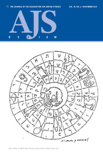
AJS Review-The Journal of the Association for Jewish Studies
Scope & Guideline
Exploring Jewish Narratives and Heritage with Scholarly Precision
Introduction
Aims and Scopes
- Jewish History and Identity:
The journal focuses on the historical narratives and experiences of Jewish communities, exploring their cultural, social, and political developments across various regions, including Europe, the Americas, and the Middle East. - Interdisciplinary Approaches:
AJS Review employs interdisciplinary methodologies, integrating insights from history, literature, sociology, religious studies, and cultural studies to enrich the understanding of Jewish life and thought. - Contemporary Jewish Thought:
The journal examines modern Jewish thought, including philosophical inquiries, ethical discussions, and the intersection of Jewish identity with contemporary issues such as nationalism, diaspora, and multiculturalism. - Critical Engagement with Texts:
A significant emphasis is placed on textual analysis, including rabbinic literature, biblical exegesis, and modern Jewish writings, to uncover deeper insights into Jewish intellectual traditions and their evolution. - Cultural Expressions and Representations:
The journal explores the various forms of cultural expression within Jewish communities, including literature, art, music, and performance, and how these reflect and shape Jewish identities.
Trending and Emerging
- Gender and Jewish Identity:
There is a growing emphasis on gender studies within Jewish contexts, exploring how gender identity intersects with Jewish life, culture, and religious practices, reflecting broader societal conversations about gender. - Global Jewish Experiences:
Recent publications increasingly focus on the diverse experiences of Jewish communities worldwide, reflecting a trend towards examining Jewish identity in a globalized context, including diasporic studies and transnational narratives. - Jewish Responses to Modernity:
The journal has seen an uptick in articles analyzing Jewish thought and practice in response to modernity, including discussions on secularism, assimilation, and the redefinition of Jewish identity in contemporary society. - Cultural Memory and Representation:
There is an emerging interest in how Jewish culture is represented in various media, including film, literature, and visual arts, highlighting the role of cultural memory in shaping Jewish identity and collective narratives. - Historical Reappraisals:
Recent themes include critical reexaminations of historical events and figures within Jewish history, challenging established narratives and seeking to uncover marginalized voices and perspectives.
Declining or Waning
- Traditional Rabbinic Literature:
There has been a noticeable decrease in articles focused specifically on traditional rabbinic literature and its historical contexts, suggesting a shift towards more contemporary or interdisciplinary themes. - Jewish Mysticism and Kabbalah:
Research on Jewish mysticism, particularly Kabbalah, appears to be waning, as fewer articles engage with its historical development or contemporary relevance compared to previous years. - Jewish Life in Eastern Europe:
The focus on Eastern European Jewish life, particularly in historical contexts prior to the Holocaust, seems to be less prominent, indicating a potential shift towards more global or diasporic perspectives. - Jewish-Christian Relations:
Although still a relevant topic, there seems to be a decline in the frequency of articles examining Jewish-Christian dialogues and their historical implications, possibly reflecting a broader trend towards intra-Jewish studies. - The Holocaust and Memory Studies:
While still a critical area of research, there is a perception that articles specifically centered on Holocaust memory and its implications have decreased, potentially indicating a shift towards examining broader themes of Jewish identity and experience.
Similar Journals
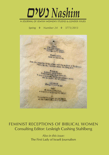
Nashim-A Journal of Jewish Womens Studies & Gender Issues
Illuminating the Rich Tapestry of Jewish Women's ExperiencesNashim: A Journal of Jewish Women's Studies & Gender Issues, published by Indiana University Press, stands as a pivotal platform for interdisciplinary scholarship at the intersection of Jewish studies, gender studies, and cultural discourse. With an ISSN of 0793-8934 and e-ISSN 1565-5288, this journal offers a vital repository of research and critical analysis, specifically highlighting the experiences and contributions of Jewish women across historical and contemporary contexts. Although classified in Q4 of the 2023 category quartiles for Arts and Humanities, Cultural Studies, and Gender Studies, it serves to amplify underrepresented voices and themes that are crucial for understanding societal dynamics. The journal spans from 2013 to 2024 and welcomes contributions that engage thoughtfully with gender issues in Jewish contexts, making it an essential resource for researchers, educators, and students alike, who are dedicated to exploring the rich complexities within this field of study. While Open Access is not currently supported, access to its in-depth articles can be sought through institutional databases and libraries, ensuring that its impactful research reaches those who seek it.

Nordisk Judaistik-Scandinavian Jewish Studies
Bridging Cultures: Unveiling Jewish Identity in ScandinaviaNordisk Judaistik-Scandinavian Jewish Studies is a distinguished academic journal dedicated to the exploration of Jewish culture, history, and religious practices in the Scandinavian context. Published by the DONNER INSTITUTE FOR RESEARCH ON RELIGIOUS AND CULTURAL HISTORY in Finland, this journal has been an open access platform since 2016, allowing easy dissemination of knowledge and fostering scholarly communication among researchers, educators, and students. With a variety of subjects encompassing Anthropology, Cultural Studies, History, and Religious Studies, the journal has achieved commendable recognition, with its latest rankings placing it in Q2 in several categories according to the 2023 Scopus rankings. The journal's significant contribution to the field is evident through its impact, evidenced by its strategic position within its respective quartiles. By bridging interdisciplinary methodologies and Jewish studies within a Scandinavian framework, Nordisk Judaistik serves as an essential resource for those engaged in the complexities and nuances of Jewish heritage and identity in the region.
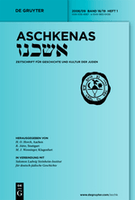
Aschkenas-Zeitschrift fuer Geschichte und Kultur der Juden
Enriching Interdisciplinary Perspectives on Jewish CultureAschkenas-Zeitschrift fuer Geschichte und Kultur der Juden, published by WALTER DE GRUYTER GMBH, is a distinguished academic journal that delves into the rich history and cultural heritage of Jewish communities. Based in Germany, this journal is indexed under the ISSN 1016-4987 and E-ISSN 1865-9438, making its contributions accessible to an international audience. Although it currently operates without open access options, the journal serves as an important platform for researchers in the fields of Arts and Humanities, History, Literature and Literary Theory, and Religious Studies, as evidenced by its publication history from 1996 to 2023. While ranked in the fourth quartile across various categories on Scopus, the journal provides critical insights and interdisciplinary approaches that enrich the understanding of Jewish cultural narratives. Researchers, professionals, and students alike will find valuable content that not only highlights historical perspectives but also engages with contemporary cultural discussions. This journal remains a vital resource for those seeking to deepen their knowledge and contribute to ongoing dialogues in Jewish studies.

Quest-Issues in Contemporary Jewish History
Fostering Scholarly Dialogue on Modern Jewish ExperiencesQuest - Issues in Contemporary Jewish History is a pivotal open-access journal published by the Fondazione Centro Documentazione Ebraica Contemporanea in Italy. Since its inception in 2010, this journal has been dedicated to the scholarly exploration of the multifaceted dimensions of contemporary Jewish history, making significant contributions to the fields of history and cultural studies. With an ISSN of 2037-741X, it serves as a vital platform for researchers, professionals, and students alike, providing access to an array of insightful articles and research findings. As of 2023, it holds a respectable Q3 ranking in the History category within Scopus, indicating its growing influence in academia, alongside a rank of #899 out of 1760 in Arts and Humanities – History. This makes it an essential resource for those looking to deepen their understanding of Jewish history in a contemporary context. The journal, with its rich scholarly outputs converging from 2017 to 2023, is based in Milan and strives to foster high-quality research in Jewish studies.
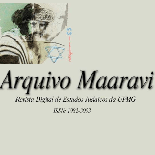
Arquivo Maaravi-Revista Digital de Estudos Judaicos da UFMG
Innovative Perspectives on Jewish HeritageArquivo Maaravi-Revista Digital de Estudos Judaicos da UFMG is a distinguished open-access journal dedicated to the field of Jewish Studies, published by the Universidade Federal de Minas Gerais (UFMG). With an ISSN of 1982-3053, the journal has been serving the academic community since 2007, facilitating the dissemination of research and scholarship in Jewish cultural, historical, and religious studies. Situated in the vibrant academic landscape of Brazil, the journal aims to foster dialogue among researchers, professionals, and students, providing a platform for innovative and critical perspectives. Although the H-Index and specific Scopus ranks are not available, the journal's commitment to academic rigor and open access ensures that its content reaches a broad audience, empowering researchers and enriching the field of Jewish studies worldwide. The journal is based at FAC Ciências Econômicas, Av. Antonio Carlos, 6627, Belo Horizonte MG 31270-901, Brazil, making it an integral part of the UFMG's academic ecosystem.
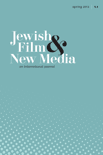
Jewish Film & New Media-An International Journal
Illuminating Jewish Identity Through Film and Media NarrativesJewish Film & New Media: An International Journal, published by Wayne State University Press, serves as a crucial platform for scholars and practitioners within the realms of Film Studies, Jewish Studies, and Media Studies. Since its inception, the journal has explored the intersection between Jewish culture and cinematic representation while also addressing contemporary media narratives. With an ISSN of 2169-0324 and E-ISSN 2169-0332, it is indexed in major databases, showcasing solid rankings in various disciplines, including a commendable Q2 rank in Visual Arts and Performing Arts. Despite its current Q4 categorizations in Anthropology and Communication, the journal is noted for its engaging contributions that sow rich discussions about Jewish identity, filmic expression, and media representation. Researchers and students alike benefit from the journal’s wealth of interdisciplinary scholarship, which spans converged years from 2013 to 2017 and 2019 to 2022, ensuring a robust timeline of critical inquiry. As an essential resource for understanding the nuances of Jewish film and new media, this journal occupies a unique niche, inviting contributions that push the boundaries of current academic dialogue.

Judaica Bohemiae
Unveiling the Nuances of Jewish Existence in BohemiaJudaica Bohemiae, published by the Zidovske Muzeum Praze, is a prominent scholarly journal dedicated to the study of Jewish culture, history, and religious practices, with a particular focus on the Czech Republic and Central Europe. Since its relaunch in 2007, the journal has established itself as a valuable resource in the fields of Cultural Studies, History, and Religious Studies, achieving a commendable Q2 ranking across these disciplines in 2023. With its thoughtful compilation of research articles and critical essays, Judaica Bohemiae offers insights into the evolving dynamics of Jewish existence and identity. Although it does not currently operate under an open access model, the journal ensures that its high-quality content remains accessible to researchers, professionals, and students interested in the nuanced intersections of culture and history. By promoting rigorous academic discourse and advancing the understanding of Jewish heritage, Judaica Bohemiae continues to play a crucial role in its field, fostering scholarly connections and illuminating the past for future generations.
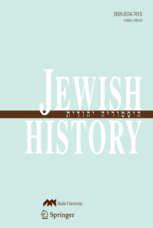
Jewish History
Connecting Communities Through Historical InsightsJewish History is a significant academic journal published by Springer, focusing on the multifaceted historical narratives of Jewish communities worldwide. With roots tracing back to 1986, this esteemed journal offers an intellectual platform where researchers and scholars can engage critically with the vast and rich tapestry of Jewish heritage, culture, and experiences. Although it operates under a traditional subscription model, the journal has gained a notable standing in recent years, achieving a Q4 ranking in Cultural Studies and a Q3 ranking in History for 2023, reflecting its robust scholarly contributions. The journal is indexed in Scopus, with a rank of #808 in Arts and Humanities History and #754 in Social Sciences Cultural Studies, placing it within the competitive landscape of academic publishing. Its commitment to advancing the field of Jewish studies makes it an essential resource for researchers, professionals, and students alike, who seek to deepen their understanding of Jewish history from historical, cultural, and social perspectives.
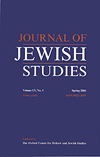
JOURNAL OF JEWISH STUDIES
Unveiling the Rich Tapestry of Jewish ThoughtJOURNAL OF JEWISH STUDIES, published by the Oxford Centre for Hebrew and Jewish Studies, stands as a distinguished platform for scholarly discourse in the fields of Jewish history, culture, literature, and religious studies. With its ISSN 0022-2097, this journal is recognized for its significant contributions to understanding Jewish heritage and thought, achieving commendable rankings in various categories, including Q1 in Literature and Literary Theory and Q2 in History and Cultural Studies, as of 2023. The journal fosters rigorous academic engagement and encourages researchers and scholars worldwide to explore the complexities of Jewish identity and its interconnections with broader historical narratives. Operating without an open access model, it nonetheless ensures a wide reach through its well-regarded reputation, making it an essential resource for anyone invested in Jewish studies. With a publication history spanning from 2002 to 2024, the journal continues to serve as an invaluable repository of knowledge and insight for students, researchers, and professionals alike.

Tradition-A Journal of Orthodox Jewish Thought
Fostering Dialogue on Jewish Philosophy and EthicsTradition: A Journal of Orthodox Jewish Thought is a prestigious academic journal published by the Rabbinical Council of America, dedicated to the exploration and analysis of Orthodox Jewish thought and its implications on contemporary issues. With a legacy dating back to 1973, this journal serves as a crucial platform for scholars, theologians, and students interested in the rich tapestry of Jewish philosophy, law, and ethics. Although it does not offer open access, its thoughtful, peer-reviewed articles are essential for advancing knowledge in Jewish academia and fostering dialogue within the broader cultural context. As an authoritative voice in the field, Tradition invites submissions that challenge, inform, and inspire further inquiry into the complexities of Jewish tradition, ensuring that it remains at the forefront of scholarly discussion.